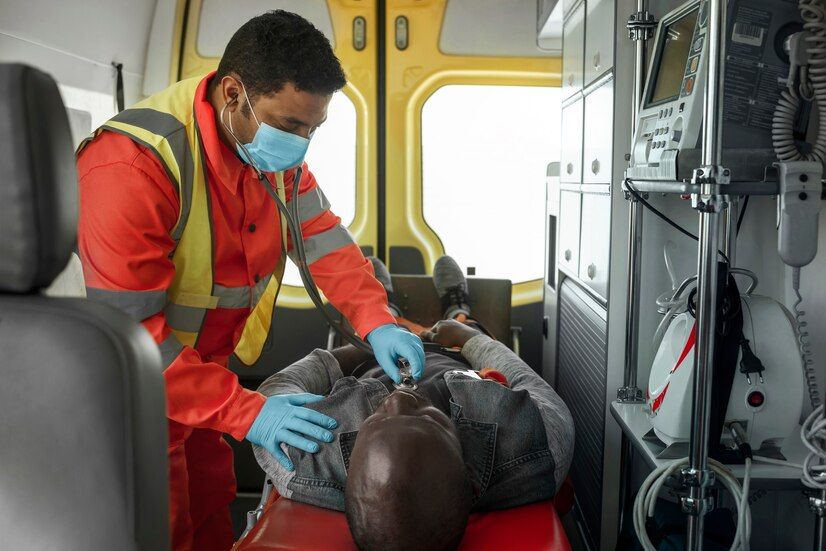
The Power of Paramedic Skills
Paramedic skills are an empowering toolkit. They shape you into a professional ready to tackle emergencies with precision and care. But did you know they open doors far beyond the back of an ambulance? As vital responders during crises, paramedics possess specialized skills applicable to an array of professions. This article explores the diverse career paths you can pursue with paramedic expertise.
Whether you're considering branching out or embarking on a new venture, these career options offer flexibility and adventure. From healthcare to educational roles, each job harnesses the invaluable skill set developed through paramedic training. Join us as we explore where a career as a paramedic might take you next.
First Responders in the Public Safety Sector
The public safety sector can be a natural progression for paramedics looking to translate their rapid-response skills. Many organizations within this sector, like fire departments and police forces, look for individuals experienced in managing high-pressure situations.
Working alongside firefighting teams, paramedics bring medical expertise to incidents involving injuries. It's a critical role that ensures immediate care is provided at accident and fire scenes. Police departments also value paramedics for their ability to address medical emergencies when EMTs are unavailable.
Paramedics seeking a leadership role may find opportunities in emergency management. This vital position involves overseeing disaster response strategies and utilizing coordination and planning skills honed throughout their medical careers.
Hospital Emergency Room Technicians
For those drawn to the hustle and bustle, working as an emergency room technician offers a promising avenue. Paramedics bring a unique perspective to fast-paced hospital environments. Their experience operating in critical care settings makes them indispensable when handling acute medical cases.
ER technicians assist doctors and nurses by conducting initial patient assessments and administering treatments. The ability to stay calm under pressure and make quick decisions is crucial. Shifts are dynamic, keeping paramedics engaged as they provide front-line care within hospital walls.
This job provides vital insights into hospital operations. It's also a stepping stone for paramedics considering further medical education, such as nursing or physician assistant programs. Learn How to become a Paramedic.
Flight Paramedics
For paramedics seeking high-altitude excitement, a career as a flight paramedic offers unique challenges. These professionals accompany air ambulances on missions, delivering critical care while en route to hospitals.
Flight paramedics possess advanced medical training, equipping them to perform life-saving interventions in transit. The role requires proficiency in aeromedical protocols and equipment. Adapting to confined spaces and altitude changes is essential.
Becoming a flight paramedic is an opportunity to work in unison with pilots, nurses, and hospital staff—a thrilling extension of skills initially honed on the ground.
Offshore Medic Roles
If the ocean calls to you, an offshore medic position might be of interest. These paramedics work on oil rigs, ships, or expedition voyages, providing medical care far from traditional healthcare settings.
Carrying a hefty responsibility, offshore medics design health protocols and respond to emergencies in isolated environments. They handle a wide range of scenarios, from minor injuries to severe medical conditions.
This role offers adventure but demands adaptability. Paramedics encounter diverse cultures, weather conditions, and medical situations around the globe. It's perfect for those comfortable with maritime settings and seeking unique experiences.
Education and Training Roles
Teaching and training are rewarding avenues for paramedics passionate about sharing knowledge. Educational institutions, such as community colleges or vocational training centres, seek paramedic instructors to guide future healthcare professionals.
Paramedics also contribute to training programs designed for corporate workplaces, teaching first aid and emergency preparedness initiatives. By passing on valuable skills to students or employees, they contribute to community safety and preparedness.
For paramedics who prefer non-clinical environments, lecturing and mentoring provide a significant impact while enabling steady working hours.
Tactical Medicine
Tactical medicine offers an intersection of medical expertise within law enforcement or military scenarios. Paramedics in this field support SWAT teams or military units by providing emergency care during tactical operations.
Paramedics are trained in advanced obstacles, triage, and teamwork. They apply skills to stabilize patients in volatile situations, often working alongside armed forces or security services.
Tactical medicine demands quick thinking, physical endurance, and a cooperative spirit. It's a demanding yet deeply gratifying career for paramedics with an interest in law enforcement.
Community Health Centers
Paramedics also play pivotal roles within community health centres, addressing public health needs. Within these centres, they assist with patient triage, manage medical appointments, and promote preventative healthcare initiatives.
Community health positions suit paramedics eager to build ongoing patient relationships and foster health literacy. The focus is on proactive health measures, empowering individuals within their community.
Joining these centres lets paramedics experience continuity of care—an opportunity to educate, advocate, and improve long-term outcomes.
Research and Development
For paramedics intrigued by data and innovation, research and development roles allow exploration within medical technology or pharmaceuticals. R&D teams benefit from paramedics' up-to-date knowledge of healthcare challenges and practical experience.
These professionals participate in developing medical equipment, testing novel treatments, or devising innovative healthcare models. Skills in data collection, testing, and compliance are beneficial here.
Careers in R&D satisfy a scientific curiosity while allowing paramedics to impact healthcare advancements indirectly.
Charting Your Path Forward
The skills acquired as a paramedic empower countless transitions into diverse career paths beyond traditional roles. Whether continuing to impact emergency medicine or exploring new domains, possibilities are endless for those ready to harness their potential.
Aspiring to take the next step? Research specific training requirements for your chosen path and explore opportunities for ongoing education. Networking with industry peers enhances your perspective and broadens your horizons.













